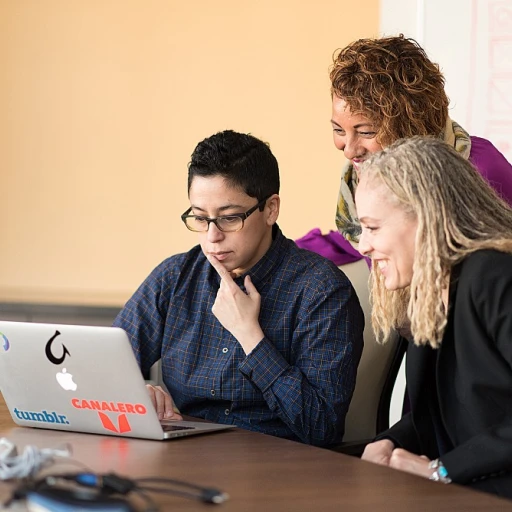Understanding Group Mentoring
The Magic of Bringing People Together
Think of group mentoring as gathering a team of mentors and mentees who come together to grow and learn from each other. While individual mentoring has its merits, group mentoring brings a different flavor to the table. It allows multiple mentees to benefit from the collective wisdom of one or more mentors. This type of program nurtures a sense of belonging and encourages mentees to feel supported by a community. Mentees, Mentors, and the Power Mix In a group setting, everyone contributes their unique experiences, making the interactions rich and layered. The mix of perspectives encourages learning and solutions that mentees might not encounter in one-on-one mentoring. Having the chance to actively participate with others can spark professional growth and personal insights, creating a mentoring environment that's both stimulating and beneficial. Group Getting Together Group mentoring sessions often revolve around shared goals or topics that resonate with everyone involved. Imagine the power of a well-structured program where ideas bounce around, creating an atmosphere of mutual learning and skill-sharing. These group sessions provide an opportunity for mentees to explore different viewpoints and experiences, allowing them to broaden their understanding in a supportive setting. For more on tapping into diverse perspectives in mentoring, explore the potential of cross-functional mentoring programs. The broader the pool of insights, the better equipped participants will be in navigating their professional journeys. Connection and Collaboration Building a group mentorship program helps foster a connected environment where individuals can tap into each other's strengths. Not only does this foster collaboration, but it also encourages a culture of continuous learning. The interaction between group members allows for accountability and offers encouragement, important elements that boost motivation and commitment to personal and professional goals.Building a Supportive Network
Creating Connections That Matter
In the world of group mentoring, the magic often lies in the connections that form between members. Imagine a room filled with diverse individuals, each bringing their own experiences and perspectives. This isn't just a gathering; it's a melting pot of ideas and support. When mentees engage with multiple mentors and fellow mentees, they build a network that extends beyond the formal mentoring sessions. These connections often lead to long-lasting professional relationships, opening doors to opportunities that one might not have encountered otherwise.
Take Sarah, for example. She joined a group mentoring program at her company and found herself surrounded by colleagues from different departments. Through the program, she connected with John, a mentor from the marketing team. Their shared interest in project management sparked a collaboration that not only enhanced Sarah's skills but also led to a successful cross-departmental initiative. It's stories like Sarah's that highlight the power of group mentoring in fostering meaningful connections.
Embracing Diversity for Broader Insights
One of the standout benefits of group mentoring is the diversity of perspectives it brings to the table. When you have a group of people from different backgrounds, industries, and experiences, the richness of the discussion is unparalleled. This diversity encourages mentees to think outside the box, challenge their assumptions, and gain insights they might not encounter in one-on-one mentoring.
Consider a group mentoring session where employees from various sectors come together. A mentor from the tech industry might share insights on innovation, while someone from finance could offer strategies for budget management. This exchange of ideas is invaluable for personal and professional growth, as it broadens the horizons of all group members.
For more insights into how cross-functional mentoring programs can further enhance these experiences, check out Unlocking the Power of Cross-Functional Mentoring Programs.
Diverse Perspectives and Insights
Variety is the Spice of Growth
Group mentoring brings a potpourri of perspectives to the table. When you gather around with a bunch of folks, each bringing their own experiences, backgrounds, and insights, it feels like taking a trip without leaving the room. It's amazing how unalike experiences from different walks of life can mesh perfectly into a singular narrative that all the mentees can learn from. Imagine sitting next to a colleague who sailed through a similar professional jam you find yourself in or who holds a treasure trove of expertise you've yet to tap into. In this group setting, everyone gets a chance to voice their opinions and share their stories. Mentees often benefit as they chime in with fresh takes, while mentors are also inspired by the zestful enthusiasm of new minds. There's power in this collective learning process. The group becomes a melting pot of ideas, when everyone lifts the lids of their minds and pours their thoughts into the mix.Greater Mentoring Opportunities
When you're part of a group mentoring arrangement, it's like shopping at a store with endless options rather than a single aisle. Each mentor brings their distinct expertise to the table, allowing mentees to gather a wealth of knowledge. The beauty of group mentoring is that the learning never narrows down to a single viewpoint. Instead, it becomes a wide canvas of ideas, painted with a rainbow of colors, thanks to mentors of different experiences and the zest of varied mentee questions. To further equip yourself, check out how to effectively structure a mentoring program. There's good stuff on boosting your learning curve and avoiding the old routine pitfalls. Throughout this group mentoring journey, everyone plays dual roles—sometimes as a teacher, other times as a student. This give-and-take enriches the learning experience.Collective Wisdom and Learning
This mentoring style undoubtedly fuels professional growth because mentees aren't just soaking in information singularly. They're part of a bigger hive where learning becomes a shared experience. As mentees observe and learn from the involvements of others, they naturally build acumen in addressing problems from different angles. In group mentoring programs, an employee might find hidden talents and skills while interacting with peers from varied departments or even industries. In this organic exchange, collective wisdom enhances mentees' proficiency. A mentoring group offers a safety net where trial and error are not only accepted but encouraged, paving the way for real-world skills and knowledge. Thus, for both mentees and mentors, it's about learning together, celebrating milestones, and encouraging each other to accomplish goals. This promise of information exchange and growth keeps everyone coming back for more, making a group mentoring relationship flourish effortlessly.Skill Development and Knowledge Sharing
Boosting Skills and Sharing Knowledge
When it comes to group mentoring, the magic happens when skills and knowledge flow freely among the group members. Imagine sitting in a room where each mentee and mentor brings their own set of experiences and expertise. This collective pool of wisdom can be a goldmine for professional growth.
In a group setting, mentees are exposed to a variety of skills that they might not encounter in one-on-one mentoring sessions. For example, a mentee in a marketing role might learn about financial analysis from a mentor in finance, or pick up leadership tips from a mentor in human resources. This cross-pollination of skills is one of the standout benefits of group mentoring programs.
Moreover, the group dynamic encourages open discussions and brainstorming sessions, where employees can learn not just from the mentors but also from each other. This interactive environment fosters a culture of continuous learning and development, where everyone is both a teacher and a student.
Mentors also benefit from this setup. They gain fresh insights and perspectives from multiple mentees, which can help them refine their own mentoring techniques and professional skills. It's a two-way street where everyone walks away with something valuable.
In essence, group mentoring acts as a catalyst for skill enhancement and knowledge sharing, making it a powerful tool for personal and professional development. As mentees and mentors engage in these sessions, they not only achieve their individual goals but also contribute to the collective success of the mentoring group.
Increased Accountability and Motivation
Boosting Commitment Through Collective Strength
Embracing group mentoring brings a mix of shared commitment and individual growth. In these group settings, each person isn’t just focused on their journey, but also feels responsible for the collective progress. This creates a sense of accountability which propels everyone forward. Imagine a group of employees working together in a mentorship program; they all have objectives to hit. But in a group mentoring format, each mentee finds that their goals are intertwined with the success of the group as a whole. When mentees unite with mentors who bring varied expertise, there's a magical spark of motivation that kindles within each group member. Each participant wants to bring their best, not just for their own development but also to uplift others. This mutual encouragement often leads to someone trying out a new skill or pushing themselves out of the comfort zone. This isn’t just about meeting individual goals but working with other mentees to discover new talents and strategies. In traditional mentoring, mentees might drop the ball here and there, not because they aren’t capable, but sometimes life gets in the way. But with group mentoring sessions, everyone keeps each other on track, reducing the chance of procrastination. Picture this: during a group session, mentors deliver a task, and the group has to work together to achieve it. The combined efforts of the group make sure that no one slacks off since the outcome impacts the whole team. Mentoring groups are perfect learning environments where mentees have the chance to reflect on their progress collectively. As each session unfolds, group members gather feedback not just from their mentors but from peers too. This multi-layered feedback loop fosters an engaged peer-driven accountability that sees the group thrive. It’s about knowing you’re part of something bigger and that your contribution matters. Bouncing off the previous parts that highlighted how diverse insights fuel learning and growth, this collective accountability ensures that there’s always someone to lend a hand, give a different perspective, or even challenge a thought process. Through shared experiences in a group mentorship program, employees gain a robust network of support that ignites both personal and professional growth.Overcoming Challenges in Group Mentoring
Conquering Hurdles in Group Mentoring
In any group mentoring program, challenges are part and parcel of the experience. Yet, overcoming them can be a testament to the strength of mentoring relationships, offering valuable lessons for both mentors and mentees. First, let’s talk about aligning goals. While individual mentoring allows for personalized objectives, with multiple mentees in a group setting, aligning everyone's goals can be tricky. Mentors should encourage open discussions during mentoring sessions, offering a safe space for mentees to voice their personal and professional goals. This can help manage expectations and create a shared vision for the group. Communication is another potential stumbling block. In a group mentorship dynamic, ensuring everyone feels heard is key. Mentees might feel overshadowed in larger groups. Thus, mentors should promote active participation, perhaps by rotating leads for each session or setting aside time for individual check-ins. Managing diverse viewpoints isn’t always straightforward. Remember, diverse perspectives and insights are a major advantage, as previously discussed. Here, the mentor’s role is to guide constructive dialogue, drawing on the varied experiences of group members. Group dynamics can also pose challenges. Conflicts may arise, and the mentor's ability to foster an inclusive, respectful environment is crucial. Clear ground rules set from the beginning can act as guardrails allowing effective conflict resolution when required. One particular challenge is maintaining engagement over time. Enthusiasm can dwindle if the program feels stagnant. Injecting variety into the sessions, such as guest speakers or on-site visits, can help keep things invigorated and the group motivated. Lastly, addressing disparities in learning speed and style is vital. While one mentoring approach may work for some, others may struggle. Flexibility in methods, perhaps through breakout groups or tailored tasks, can cater to individual needs while preserving the group spirit. Overcoming these hurdles not only strengthens the program’s impact but significantly contributes to the professional growth of all participants. With careful attention and committed mentors, these challenges can transform into stepping stones toward a successful mentoring journey. References:- Blake-Beard, S., O'Neill, R. M., & McGowan, E. M. (2007). Developing an effective online mentoring program for new faculty members. Review of Educational Research.
- Eby, L. T., & Allen, T. D. (2012). Definition and evolution of mentoring. In The Blackwell Handbook of Mentoring: A Multiple Perspectives Approach.











